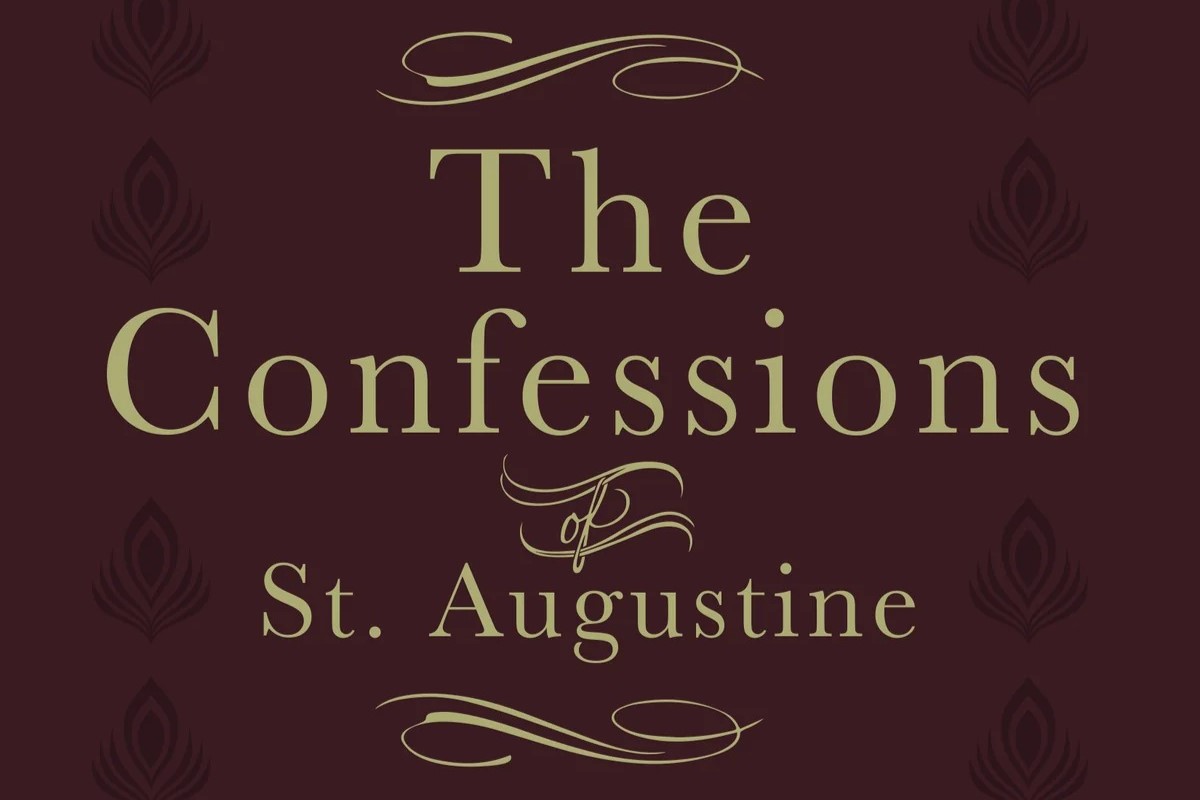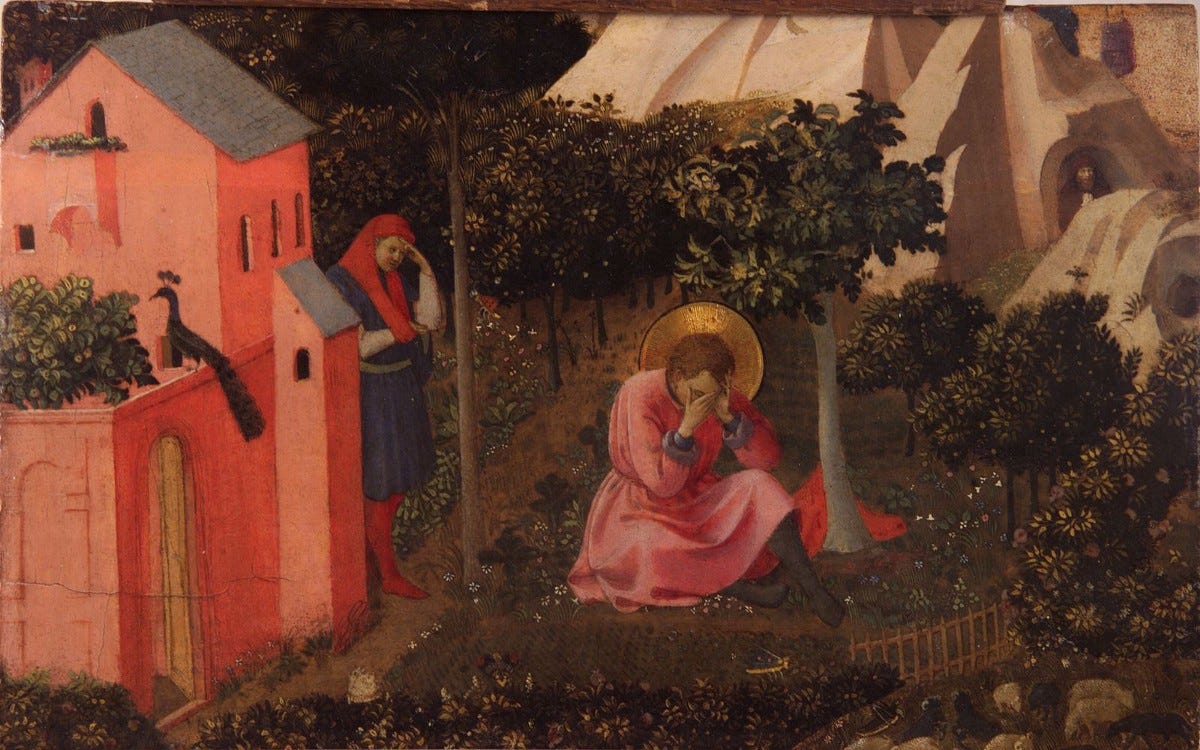Home>Theology and Spirituality>Why Is Augustine Of Hippo’s Confessions Particularly Noteworthy As A Literary Work


Theology and Spirituality
Why Is Augustine Of Hippo’s Confessions Particularly Noteworthy As A Literary Work
Published: February 10, 2024
Peter Smith, Editorial Director at Christian.net, combines deep insights into faith, politics, and culture to lead content creation that resonates widely. Awarded for his contributions to religious discourse, he previously headed a major organization for religious communicators, enhancing dialogue on faith's societal impacts.
Discover why Augustine of Hippo's Confessions stands out as a literary masterpiece in the realm of theology and spirituality. Explore its profound significance and enduring impact.
(Many of the links in this article redirect to a specific reviewed product. Your purchase of these products through affiliate links helps to generate commission for Christian.net, at no extra cost. Learn more)
Table of Contents
- Introduction
- Augustine of Hippo: A Brief Biography
- The Structure and Style of Confessions
- The Influence of Classical Literature on Confessions
- The Role of Confessions in the Development of Autobiography as a Literary Genre
- The Spiritual and Philosophical Themes in Confessions
- The Enduring Legacy of Confessions in Literature and Philosophy
Introduction
Augustine of Hippo's "Confessions" stands as a timeless masterpiece that transcends the boundaries of time and culture. This profound work of literature has captivated readers for centuries, offering a deeply introspective and spiritually enriching journey through the life and thoughts of one of the most influential figures in Christian theology.
As we delve into the intricacies of "Confessions," we unravel the layers of Augustine's profound introspection, his struggles, and his unwavering faith. This literary treasure invites readers to witness the innermost thoughts and emotions of a man grappling with the complexities of human existence and the pursuit of divine truth.
"Confessions" is not merely a recounting of events; it is a profound exploration of the human experience, a candid reflection on the nature of sin and redemption, and a testament to the enduring power of faith. Through the pages of this work, Augustine invites readers to embark on a deeply personal and introspective journey, delving into the depths of his own soul while simultaneously touching upon universal themes that resonate across time and space.
In the following sections, we will explore the remarkable life of Augustine of Hippo, the structural and stylistic elements that define "Confessions," the profound influence of classical literature on this work, and the pivotal role of "Confessions" in shaping the development of autobiography as a literary genre. Furthermore, we will delve into the spiritual and philosophical themes that permeate the pages of this extraordinary work, and examine the enduring legacy of "Confessions" in literature and philosophy.
As we embark on this exploration, we will unravel the profound impact of "Confessions" as a literary work that continues to inspire and provoke contemplation, inviting readers to ponder the complexities of human nature, the pursuit of truth, and the enduring quest for spiritual fulfillment.
Read more: When Was Augustine Of Hippo Born
Augustine of Hippo: A Brief Biography
Augustine of Hippo, also known as Saint Augustine, was a pivotal figure in the development of Western Christianity and a profoundly influential philosopher and theologian. Born on November 13, 354, in Thagaste, a Roman province in North Africa (present-day Algeria), Augustine's early life was marked by a blend of intellectual curiosity and spiritual yearning.
Raised in a devout Christian household by his mother, Monica, Augustine received a classical education in rhetoric and literature. His intellectual pursuits led him to Carthage, where he immersed himself in the study of philosophy and rhetoric, eventually embracing the teachings of the Manichaean religion. However, his quest for truth and spiritual fulfillment continued to evolve, leading him on a transformative journey that would ultimately shape the course of his life and legacy.
After a period of intellectual exploration and personal struggles, Augustine experienced a profound conversion to Christianity, influenced in part by the renowned orator and bishop, Ambrose of Milan. This pivotal moment marked the beginning of Augustine's unwavering commitment to the Christian faith and his emergence as a formidable theological thinker.
In 391, Augustine was ordained as a priest and later assumed the role of Bishop of Hippo, a position he held until his passing in 430. Throughout his life, Augustine grappled with profound theological and philosophical questions, addressing issues such as the nature of evil, the concept of time, and the relationship between faith and reason.
His literary contributions, including monumental works such as "Confessions" and "The City of God," solidified his reputation as one of the most influential figures in Christian theology and Western philosophy. Augustine's writings continue to shape theological discourse and philosophical inquiry, offering profound insights into the complexities of human nature, the pursuit of truth, and the enduring quest for spiritual enlightenment.
Augustine's enduring legacy extends far beyond his intellectual contributions; his life and writings serve as a testament to the transformative power of faith, the resilience of the human spirit, and the enduring pursuit of divine truth. His profound impact on Christian thought and Western philosophy continues to resonate across centuries, inspiring generations of scholars, theologians, and seekers of truth.
In the annals of history, Augustine of Hippo stands as a towering figure whose life and legacy continue to illuminate the path of spiritual inquiry and intellectual exploration, inviting individuals to contemplate the profound mysteries of existence and the enduring relevance of faith in the human experience.
The Structure and Style of Confessions
The structure and style of Augustine of Hippo's "Confessions" are emblematic of its profound literary and philosophical significance. Composed in the form of an autobiographical narrative, "Confessions" is a deeply introspective work that unfolds in 13 books, each bearing its own thematic significance and contributing to the overarching narrative of Augustine's spiritual journey.
Augustine's masterful use of language and rhetoric infuses "Confessions" with a captivating and deeply personal tone, drawing readers into the inner sanctum of his thoughts and emotions. The work is characterized by a seamless blend of introspection, theological inquiry, and philosophical contemplation, creating a rich tapestry of literary expression that transcends the boundaries of time and culture.
The narrative unfolds as a heartfelt dialogue between Augustine and God, as he grapples with the complexities of human existence, the nature of sin, and the pursuit of divine truth. Through a series of introspective reflections, Augustine weaves together the threads of his life, seamlessly intertwining personal anecdotes, philosophical musings, and theological insights.
The structural composition of "Confessions" reflects Augustine's profound intellectual and spiritual journey, as he navigates the depths of his own soul while engaging with timeless questions of faith, morality, and the nature of God. Each book serves as a distinct chapter in Augustine's quest for spiritual enlightenment, offering a nuanced exploration of his evolving thoughts and experiences.
Furthermore, Augustine's stylistic prowess is evident in his ability to seamlessly transition between personal recollections and profound theological discourse, creating a work that is both deeply intimate and intellectually stimulating. His use of vivid imagery, rhetorical devices, and poignant metaphors elevates "Confessions" to a level of literary artistry that continues to captivate readers across generations.
In essence, the structure and style of "Confessions" embody the profound depth of Augustine's introspection and the enduring relevance of his spiritual and philosophical inquiries. Through its masterful composition and evocative prose, "Confessions" stands as a testament to the enduring power of introspective literature and the timeless allure of the human quest for spiritual fulfillment.
The Influence of Classical Literature on Confessions
The profound influence of classical literature permeates the pages of Augustine of Hippo's "Confessions," shaping the thematic underpinnings and stylistic nuances of this timeless work. Augustine's engagement with classical texts, particularly those of the ancient Greek and Roman traditions, serves as a cornerstone of inspiration that enriches the depth and breadth of "Confessions."
In his autobiographical narrative, Augustine masterfully integrates elements of classical literature, drawing upon the works of renowned philosophers and poets to infuse his reflections with intellectual richness and literary elegance. The influence of classical thought is palpable throughout "Confessions," as Augustine engages with the philosophical inquiries of figures such as Plato and Cicero, weaving their profound insights into the fabric of his own introspective journey.
The dialogues of Plato, with their profound explorations of truth, virtue, and the nature of the soul, resonate deeply within the pages of "Confessions," shaping Augustine's contemplations on the pursuit of divine wisdom and the complexities of human existence. Similarly, the eloquence and rhetorical prowess of Cicero find echoes in Augustine's own stylistic flourishes, as he employs language and rhetoric to craft a narrative that is both intellectually stimulating and emotionally resonant.
Moreover, the influence of classical literature extends beyond philosophical discourse, permeating the thematic landscape of "Confessions." The timeless themes of love, longing, and the quest for meaning, as explored by poets such as Virgil and Ovid, find poignant expression in Augustine's introspective musings, adding layers of emotional depth and universal resonance to his narrative.
By embracing the legacy of classical literature, Augustine elevates "Confessions" to a work of profound intellectual and literary significance, infusing his autobiographical reflections with the enduring wisdom and timeless allure of ancient philosophical and poetic traditions. The influence of classical literature serves as a testament to Augustine's reverence for intellectual inquiry and literary artistry, enriching "Confessions" with a depth of insight and literary sophistication that continues to captivate readers across centuries.
The Role of Confessions in the Development of Autobiography as a Literary Genre
Augustine of Hippo's "Confessions" holds a seminal position in the evolution of autobiography as a literary genre, laying the foundation for introspective self-examination and personal narrative that would profoundly influence subsequent autobiographical works. As one of the earliest and most influential autobiographical writings, "Confessions" established a template for the exploration of personal experiences, emotions, and spiritual introspection that continues to resonate in the realm of literature.
The profound impact of "Confessions" on the development of autobiography is rooted in Augustine's candid and introspective approach to recounting his life experiences and spiritual journey. By delving into the depths of his own soul and candidly addressing his personal struggles, doubts, and moments of epiphany, Augustine set a precedent for the intimate and introspective nature of autobiographical writing. His unflinching exploration of his own humanity and spiritual quest paved the way for future writers to engage in similarly candid and introspective self-examination within their autobiographical works.
Furthermore, "Confessions" introduced a compelling blend of personal narrative, philosophical inquiry, and theological reflection, demonstrating the potential for autobiographical writing to transcend mere recounting of events and delve into profound existential and spiritual themes. Augustine's seamless integration of personal experiences with broader philosophical and theological contemplations established a paradigm for autobiographical works to intertwine individual narratives with universal themes, enriching the genre with intellectual depth and emotional resonance.
The enduring legacy of "Confessions" as a foundational autobiographical work lies in its ability to inspire subsequent writers to embark on their own journeys of self-discovery and introspection within the realm of autobiography. Augustine's willingness to grapple with the complexities of human existence and the pursuit of divine truth set a precedent for writers to fearlessly explore their own inner landscapes, fostering a tradition of deeply personal and introspective autobiographical writing.
In essence, "Confessions" stands as a cornerstone in the development of autobiography as a literary genre, shaping the trajectory of introspective self-examination and personal narrative in literature. Augustine's candid introspection, seamless integration of personal and universal themes, and profound spiritual inquiry have left an indelible mark on the genre, inspiring generations of writers to embark on their own literary journeys of self-discovery and introspective reflection.
Read more: How To Cite Augustine Confessions
The Spiritual and Philosophical Themes in Confessions
The pages of Augustine of Hippo's "Confessions" resonate with profound spiritual and philosophical themes that encapsulate the essence of his introspective journey and theological inquiry. At its core, "Confessions" serves as a testament to Augustine's unwavering pursuit of divine truth, his contemplation of the complexities of human existence, and his profound reflections on the nature of sin and redemption.
Central to the spiritual fabric of "Confessions" is Augustine's exploration of the human condition in relation to the divine. His introspective musings delve into the depths of the soul, grappling with the inherent tension between earthly desires and the yearning for spiritual fulfillment. Augustine's candid reflections on his own struggles with sin and temptation offer a poignant portrayal of the human experience, inviting readers to confront the complexities of moral frailty and the enduring quest for spiritual enlightenment.
Moreover, "Confessions" serves as a platform for Augustine's profound theological inquiries, addressing fundamental questions about the nature of God, the complexities of divine providence, and the enigma of human suffering. Through his introspective narrative, Augustine embarks on a deeply personal dialogue with the divine, seeking to reconcile the intricacies of human existence with the transcendent reality of God's presence.
The philosophical underpinnings of "Confessions" are equally profound, as Augustine engages with timeless inquiries about the nature of truth, the pursuit of wisdom, and the complexities of human consciousness. His contemplations on the nature of time and memory offer a philosophical lens through which he navigates the intricacies of human experience, weaving together existential reflections with profound metaphysical inquiries.
Furthermore, Augustine's exploration of the relationship between faith and reason permeates the narrative, as he grapples with the interplay of intellectual inquiry and spiritual enlightenment. His introspective journey serves as a testament to the enduring quest for philosophical understanding and spiritual fulfillment, intertwining the realms of faith and intellectual inquiry in a seamless tapestry of introspective reflection.
In essence, "Confessions" stands as a profound exploration of the spiritual and philosophical dimensions of human existence, inviting readers to contemplate the complexities of faith, the pursuit of divine truth, and the enduring quest for spiritual enlightenment. Augustine's introspective narrative serves as a timeless testament to the enduring relevance of spiritual and philosophical inquiry, offering profound insights into the depths of the human soul and the transcendent reality of divine presence.
The Enduring Legacy of Confessions in Literature and Philosophy
The enduring legacy of Augustine of Hippo's "Confessions" reverberates across the realms of literature and philosophy, leaving an indelible mark on the trajectory of human thought and spiritual inquiry. As a literary work, "Confessions" continues to captivate readers with its profound introspection and timeless relevance, while its philosophical insights have permeated the discourse of Western philosophy, shaping the contours of existential inquiry and theological contemplation.
In the realm of literature, "Confessions" stands as a testament to the enduring power of introspective writing and autobiographical narrative. Augustine's candid exploration of his own spiritual journey and existential struggles has inspired generations of writers to embark on their own quests for self-discovery and introspective reflection. The work's seamless integration of personal narrative with profound philosophical and theological contemplations has set a precedent for autobiographical writing, enriching the genre with intellectual depth and emotional resonance. Furthermore, the stylistic and rhetorical prowess displayed in "Confessions" continues to serve as a source of inspiration for writers, demonstrating the transformative potential of language and narrative in conveying the complexities of human experience.
In the realm of philosophy, "Confessions" has left an enduring imprint on the discourse of existential inquiry and theological contemplation. Augustine's profound reflections on the human condition, the nature of sin and redemption, and the pursuit of divine truth have permeated the fabric of Western philosophical thought, offering profound insights into the complexities of human existence and the enduring quest for spiritual enlightenment. The work's engagement with timeless questions about the nature of God, the complexities of divine providence, and the enigma of human suffering continues to provoke contemplation and intellectual inquiry, shaping the trajectory of philosophical discourse and theological reflection.
In essence, the enduring legacy of "Confessions" in literature and philosophy lies in its ability to transcend the boundaries of time and culture, offering profound insights into the human experience and the enduring quest for spiritual fulfillment. Augustine's introspective narrative continues to inspire writers and philosophers, inviting individuals to contemplate the profound mysteries of existence and the enduring relevance of faith in the human experience. As a literary and philosophical masterpiece, "Confessions" stands as a timeless testament to the enduring power of introspective literature and the timeless allure of the human quest for spiritual enlightenment.














